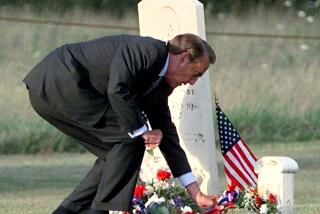Dole’s Outreach to Perot, Buchanan Voters
- Share via
WASHINGTON — For Senate Majority Leader Bob Dole of Kansas, the most important part of his campaign for the Republican nomination starts now. Not to take anything away from his successful march to the 996 delegates that secured him the nomination--but that was more about tenacity, organization, money and the best opponents he could have hoped for. There was nothing particularly strategic about the Dole campaign. It was more a testament to his stamina and to state GOP organizations following tradition and rewarding front-runners.
But preparing for the fall campaign against President Bill Clinton requires far more finesse and strategy. The first step for Dole is to secure his base, drawing into it all potential voters who don’t want to see Clinton reelected. Much of that base--traditional GOP voters--is in line. But the big missing pieces are the voters who rallied to Patrick J. Buchanan this year and, most important, those who voted for Ross Perot in 1992.
Contrary to conventional wisdom, Buchanan and Perot do not share the same base. There is overlap, of course, but there are also striking differences, some subtle, that Dole must recognize. Since all Buchanan’s voters participated in the GOP primaries or caucuses, it may be easier for Dole to reach a consensus with this bloc. This is certainly true about social conservatives who care about right to life and immigration--in the end, they began to favor Dole over Buchanan, anyway. Perot voters, however, are a more elusive target.
Now that Perot is talking about running--and how could we have doubted the little fellow would do anything else--Dole must figure out how to deal with Perot and co-opt his supporters.
The initial effort has already begun. Dole is trying to convince Perot in public statements and, from what I understand, back-channel messages that he, Dole, does represent the Perot agenda and all Perot would do by running is to ensure Clinton’s reelection. There’s some hope this will work, for Perot has nowhere near the antipathy toward Dole that he had toward George Bush in 1992.
If convincing Perot to stay out doesn’t work--my bet is it won’t--Dole must figure out a way to take voters away from Perot, keeping Perot’s national total in the single digits. There are areas where Dole can make headway, where he has already taken a strong position: balanced budgets, term limits, English as the national language, 10th Amendment states rights--all appeal to Perot voters. Dole can wrap these together with the argument that a split vote will reelect Clinton and hope the Perot voters of ’92 will rally to him.
The bigger problem for Dole, however, is that on two issues critical to Perot voters--trade and job security--the majority leader will have a hard time finding common ground. The rallying cry for ’92 Perot voters was the North American Free Trade Agreement and the General Agreement on Tariffs and Trade--and Dole was a leading supporter of both. To reverse his position now would be seen as the ultimate in pandering.
The answer might lie in Dole finding sections of the agreements that the Clinton administration is not enforcing--to the detriment of U.S. business and jobs. He could then take to the Senate floor and demand that our trading partners live up to the agreements or the United States will walk. Keep in mind, there are provisions in both treaties that allow Washington the option to disengage. This may seem a thin reed for Dole, but it may be one of the only options on trade he has.
When it comes to job security--read corporate downsizing--Dole is in an even more precarious position. His base of support, financially at least, is in corporate America and the idea of trying to coerce companies to keep workers they don’t want runs counter to every one of Dole’s beliefs. A little jawboning may be helpful here; and his friends in corporate America may get the hint and stop big layoffs until after the election. On this issue, Dole has to keep Buchanan’s base in sight, as well as Perot’s.
The good news for Dole is that he now has five months before the GOP convention to deal with the Perot problem. He also has the bully pulpit of the Senate to make his case to Perot’s constituency. The bad news is that the well of the Senate may be the worst place to address voters who consider Washington the evil empire and insiders like Dole as part of the problem.
But, for Dole, there is little choice. An unchallenged Perot would almost surely ensure Clinton’s reelection. So Dole may want to borrow a page from Buchanan’s book: Head for the OK Corral, stare Perot down and grab his herd while you can.
More to Read
Get the L.A. Times Politics newsletter
Deeply reported insights into legislation, politics and policy from Sacramento, Washington and beyond. In your inbox twice per week.
You may occasionally receive promotional content from the Los Angeles Times.










